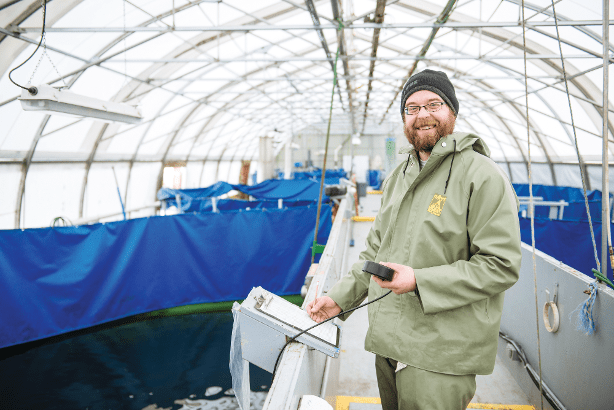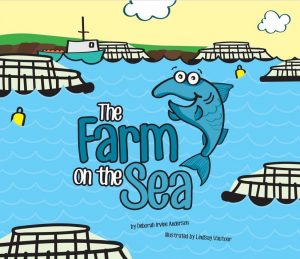Suggested Teaching & Learning Activity
Guest Visitor
- During a Community theme, students brainstorm what they already know about fish farming. Then as a class, they read The Farm on the Sea. They add the knowledge gained to what they already knew. To find out more, they learn about asking questions, prepare some questions, and invite a farmer to their classroom. Children each have a sheet with the prepared questions and listen carefully to the questions and answers so that they would not ask a question that had already been asked.
- During Career Week, invite a person involved with salmon farming.
- Invite a member of the business community (e.g. an individual involved with salmon farming) as a guest speaker to discuss how prices change because of supply and demand. Help students develop a list of questions in advance to explore with the speaker.
- Invite the author and or illustrator as a guest speaker to discuss their involvement in The Farm on the Sea. Help students develop a list of questions in advance to explore with the speaker.
- Begin by reading aloud to the class The Farm on the Sea. It tells the story of the raising salmon from eggs to adult, through to harvest. Ask students where the salmon go next: to retailers. Explain to students that salmon is the "goods" and delivery of the salmon is a "service". Discuss other goods or products that are made from salmon (sushi, smoked salmon, chowder, etc.).
- After a presentation, have students summarize the experience in a journal.
- Arrange for a guest speaker, such as a truck driver, like found in The Farm on the Sea, to visit the class and explain his/her job of connecting communities by transporting goods such as farmed salmon. If possible, take a tour of his/her tractor trailer. Before he or she comes to the class, help the children create possible interview questions. Record these on chart paper and leave space to write answers. After the guest leaves, reflect on the presentation with the children by filling in the answers. Place a model tractor-trailer in the centre and include books about transport trucks and freighters in the book centre. If you have access to them, add trucking songs to the music centre. Other guest speakers to consider are farmers, merchants or local manufacturers to illustrate other ways of connecting communities.
Offline Resources and Activities
Online Activities
Curriculum Connections
Grade K-2
- Visual Arts
- Strand 2: Connect
- GCO 3: Students will be expected to develop critical awareness of and value for the role of the arts in creating and reflecting culture. Students will begin to understand that visual art is a record of human experiences and expressions.
- K-2.3.2 Explore artworks from a variety of historical and cultural contexts.
- GCO 3: Students will be expected to develop critical awareness of and value for the role of the arts in creating and reflecting culture. Students will begin to understand that visual art is a record of human experiences and expressions.
- Strand 2: Connect
Grade K
- You and Your World
- Unit 4 – Place and Community
- Outcome K. 4.4: Identify connections between their community and other communities.
- Unit 4 – Place and Community
Grade 1
- You and Your World
- Unit 2 – Our Environment
- Outcome 1. 4. 6: Demonstrate an understanding of how communities depend on each other for the exchange of goods and services.
- Unit 2 – Our Environment
Grade 2
- You and Your World
- Unit 3 – Work
- Outcome 2.3.2: Students will be expected to give examples of how children and their families use economic decision making as consumers.
- Unit 3 – Work
Grade 1-2
- English Language Arts (Atlantic Canada)
- GCO: Students will be expected to speak and listen to explore, extend, clarify, and reflect on their thoughts, ideas, feelings and experiences.
- Express thoughts and feelings and describe experiences.
- Ask and respond to questions to clarify information or gather further information.
- Express opinions and give simple explanations for some of their opinions (I like … because)
listen to others’ ideas and opinions.
- GCO: Students will be expected to speak and listen to explore, extend, clarify, and reflect on their thoughts, ideas, feelings and experiences.
Grade 3-4
- English Language Arts (Atlantic Canada)
- GCO: Students will be expected to speak and listen to explore, extend, clarify, and reflect on their thoughts, ideas, feelings and experiences.
- Ask and respond to questions to clarify information and to explore possibilities or solutions to problems.
- Express and explain opinions and respond to the questions and reactions of others.
- Listen critically to others’ ideas and opinions.
- GCO: Students will be expected to speak and listen to explore, extend, clarify, and reflect on their thoughts, ideas, feelings and experiences.



